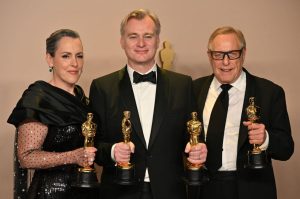If you tune in to the Oscars during the early hours of Monday morning, you’ll note — along with sickly fawning about contemporary motion pictures being high art, beautiful people in beautiful clothes, and the kind of feigned surprise that wouldn’t look out of place in a school production — two glaring anomalies in the line-up: ‘Best Actress’ and ‘Best Supporting Actress’.
The Academy of Motion Picture Arts and Sciences has recognized a leading actress every year since 1929. It’s one of the oldest prizes for women in the arts. Back in the Twenties, when there was even less of a chance a studio would let a woman write or direct a film, winning Best Actress was the pinnacle of female achievement. But if the Academy wants to be taken seriously as an arbiter of artistic merit, it needs to take an ax to these two gilded figurines.
Together with their male equivalents, the Best Actress and Best Supporting Actress categories are the only gendered awards in the ceremony. These days, they ought to be unnecessary. There’s no award for Best Female Director, or Best Score by a Woman. If the industry is genuinely in favor of gender equality, then the best women need to be pitted against the best men.
Having separate categories for men and women suggests that either the demands of female and male performers are different, or that women aren’t able to compete alongside men. Although the types of roles given to male and female stars have been different, good acting is the same for both genders. And Viola Davis is more than capable of competing against Anthony Hopkins and Gary Oldman.
Female stars have already taken the first step towards acting equality — even if they didn’t realize it — by increasingly referring to themselves not as actresses, but actors. The logical conclusion of this is simple: that women are equal to men and should be judged in the same categories at award ceremonies.
A natural by-product of the change would be that women would win fewer prizes. But this could be a crucial step in the quest for parity. At the moment, the lack of serious roles for women is obscured by the gendered categories. Slashing the Best Actress awards would cast a light on the fact that they enjoy fewer multi-dimensional parts. It would lay bare the double standards of the film industry and force the inert motion picture industry to adapt.
It might even be in the Oscars’ long-term interest. Just wait for the furore when the Academy has to evaluate the performance of a trans or nonbinary actor. When someone doesn’t identify as male or female, how do you decide their award category?
The public would win, too. Nominating five actors regardless of their gender would make the award much more interesting. Usually there are a few nominees in each category who are unlikely to actually win. Having five genuine contenders for once would bring some drama to the occasion. And anything that makes the ceremony shorter is to be welcomed.
Industry accountants wouldn’t like the change, of course. Oscar winners sell films — think of all those trailers that tell you they feature Academy Award Winner Joe Bloggs. There’s also an argument that minorities and emerging stars would be hit hardest, if they are less likely to win an award. But so far, in 92 editions, the Best Actress award hasn’t exactly provided much diversity. As many non-white women have won the award as princesses.
At the moment you don’t hear many actors (female or male) calling for the end of gendered awards, perhaps because female stars want ways to attain equality that don’t hit their profile or pay packet. But if Hollywood is committed to equal treatment of men and women, these changes would be implemented and welcomed. And about time, too. Because, until we take away a woman’s best chance for a gong, we won’t have anything approaching equality.
This article was originally published on The Spectator’s UK website.


















